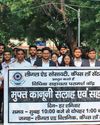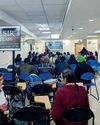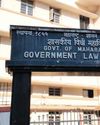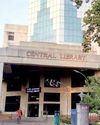
Feroz Alam is “compelled” to freelance as a proofreader for a private company to continue his research at University of Delhi (DU). From Bihar’s Champaran district, Alam is enrolled in PhD at DU’s history department. He receives a paltry Rs 8,000 per month as “non-NET fellowship” – a stipend given to research scholars that isn’t through the National Eligibility Test. This has affected his research on labour and migration in Indian history.
“I cannot ask for money from my parents at this age to fund my education. I am forced to do freelance jobs to support myself,” he said. Most of his stipend goes into paying rent as Alam did not get a hostel accommodation. “I am unable to purchase books and journals and I fear this may impact my research work. Food, transport, rental charges and other costs are rising but the government is not increasing the non-NET fellowship amount,” he said.
The non-NET fellowships were introduced in 2006 and fetched PhD scholars Rs 5,000 per month. It was later raised to Rs 8,000 in 2012 and has remained unchanged.
Research scholars across state and central government-run universities complained about irregularities in disbursement of fellowships, budget cuts for libraries and infrastructure issues. They also complained about discrimination in PhD admissions and malpractices in publications for appointment in higher education institutions. Professors countered saying there is lack of seriousness and motivation among students.
JRF, non-NET
Currently, PhD admissions do not follow the same criteria across universities. Candidates who qualify the University Grants Commission (UGC)’s National Eligibility Test are admitted on the basis of personal interviews.
Diese Geschichte stammt aus der March 2024-Ausgabe von Careers 360.
Starten Sie Ihre 7-tägige kostenlose Testversion von Magzter GOLD, um auf Tausende kuratierte Premium-Storys sowie über 8.000 Zeitschriften und Zeitungen zuzugreifen.
Bereits Abonnent ? Anmelden
Diese Geschichte stammt aus der March 2024-Ausgabe von Careers 360.
Starten Sie Ihre 7-tägige kostenlose Testversion von Magzter GOLD, um auf Tausende kuratierte Premium-Storys sowie über 8.000 Zeitschriften und Zeitungen zuzugreifen.
Bereits Abonnent? Anmelden

Sleeper Cells: Law schools' 'dormant' legal aid clinics
A law college survey by the Supreme Court's policy centre found that a worrying number of legal aid clinics do little more than hold legal awareness camps, despite NALSA, BCI rules. This leaves gaps in legal education

Law's new niche frontiers
How niche law programmes are blending science with legal expertise, transforming legal education and creating specialised career paths

'GP Sir's classes' a ray of hope for the poor
Shrishti (name changed), 31, hails from the Valmiki community based in Gurdaspur, Punjab; she was born into a family of safai karamcharis - cleaners and at 21, married into another.

DU Law Faculty is part of CLAT 2025 but plans own exam: Dean
Delhi University's Faculty of Law will admit to its BBA LLB and BA LLB courses through the CLAT exam this year.

Studying law through films, novels, comics
Law schools are using various art forms - films, comics, theatre, puppetry

Legal education meets AI
As artificial intelligence reshapes industries, India’s leading law schools are introducing specialised courses and research initiatives, often in collaboration with technical institutions. But the need for comprehensive regulations persists

A LEGACY IN CRISIS
Asia's oldest law college and alma mater to legal luminaries, Government Law College, Mumbai, now grapples with declining standards, administrative apathy, and students' shifting educational aspirations

Law Colleges for 2025
Careers360 has ranked 100 law colleges and rated over 185 institutions, categorising them into distinct zones and states, for a comprehensive overview of legal education

IIT Madras introduces another quota
After admitting five students via the sports quota in 2024-25 - a first among the IITs Indian Institute of Technology Madras has now introduced another quota for \"fine arts and culture excellence\".

CLAT answer keys and court cases
Many Common Law Admission Test (CLAT) candidates claimed to find mistakes in its provisional and final answer keys.